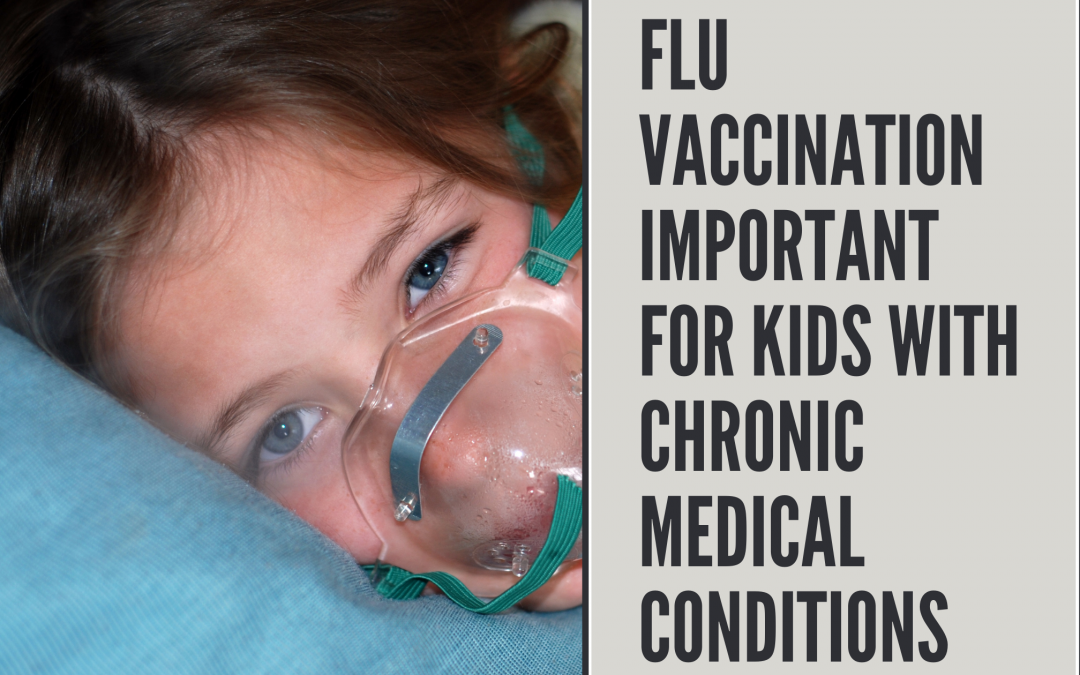National Influenza Vaccination Week took place on Dec. 5-11. It was a wake-up call that there’s still time for everyone 6-months of age and older to get their flu vaccination. The CDC estimates that flu-related hospitalizations annually hit 7,000 to 26,000 US children (younger than five years of age)!
The flu is contagious. It is a respiratory illness caused by influenza viruses that infect the nose, throat, and lungs.
Does your child have any long-term medical conditions? If so, there is a greater chance of serious complications.
Medical Conditions
Medical conditions that could increase the risk for complications include:
- asthma
- blood disorders
- children who are taking aspirin or salicylate-containing medicines ? chronic lung disease
- endocrine disorders
- extreme obesity
- heart disease
- kidney diseases
- liver disorders
- metabolic disorders
- neurologic and neurodevelopment conditions that can include disorders of the brain, spinal cord, peripheral nerve, and muscles (such as cerebral palsy, epilepsy, stroke, intellectual disability, moderate to severe developmental delay, muscular dystrophy, or spinal cord injury)
- weakened immune system
Medical Complications
Now, most kids who get the flu get better between a few days and less than two weeks.
But some might develop complications that could be life-threatening, such as pneumonia.
Kids with asthma may have more asthma attacks. Those with chronic heart disease may see this condition get worse.
Other serious complications can include sinus & ear infections. Also, inflammation of the heart, brain, or muscle tissues. And multi-organ failures are possible (for example, respiratory and kidney failure).
Flu Symptoms
So, what do you need to be looking out for? Flu symptoms often include:
- coughing
- fatigue
- fever (not everyone with flu will have a fever)
- headache
- muscle or body aches
- sore throat
- runny or stuffed-up nose
- vomiting and diarrhea (more common in children than adults)
But, if your child is experiencing any of these following warning signs, take them right away to the emergency room:
- Fast breathing or trouble breathing
- Bluish lips or face
- Ribs pulling in with each breath
- Chest pain
- Severe muscle pain (child refuses to walk)
- Dehydration (no urine for 8 hours, dry mouth, no tears when crying)
- Not alert or interacting when awake
- Seizures
- Fever above 104° F
- Any fever in children younger than 12 weeks
- Fever or cough that improves but then returns or worsens
- Worsening of chronic medical conditions
This disease is not like the common cold!
Benefits of Flu Vaccination
The CDC says that each year the flu causes millions of illnesses, hundreds of thousands of hospitalizations, and tens of thousands of deaths in the United States.
But, there is hope in a study using data from recent flu seasons. It reports that the vaccinations reduced the risk of flu-associated death by half among children with higher risk medical conditions! The results went up to nearly two-thirds among children without medical conditions.
Another recent study showed that flu vaccination reduced admission by 74% to pediatric intensive care units.
Plain & simple: flu vaccination can keep you and your child healthy.
Get the Flu Vaccination
But flu viruses aren’t the same every year. They constantly change. So, the flu vaccination your child may have gotten in a previous year might not still protect. The CDC says getting new ones every year is the best way to prevent flu. They are the only vaccines proven to reduce the risk of flu illness, hospitalization, and death.
For more information, call CDC info at 1-800-CDC-INFO (232-4636) or go to www.cdc.gov/flu.
This post was written by Anthony M Scialis. Find him here.

